The global animal immunoassay kits market is projected to grow from USD 603.5 million in 2025 to approximately USD 964.5 million by 2035, recording an absolute increase of USD 361.0 million over the forecast period. This translates into a total growth of 59.8%, with the market forecast to expand at a compound annual growth rate (CAGR) of 4.8% between 2025 and 2035.
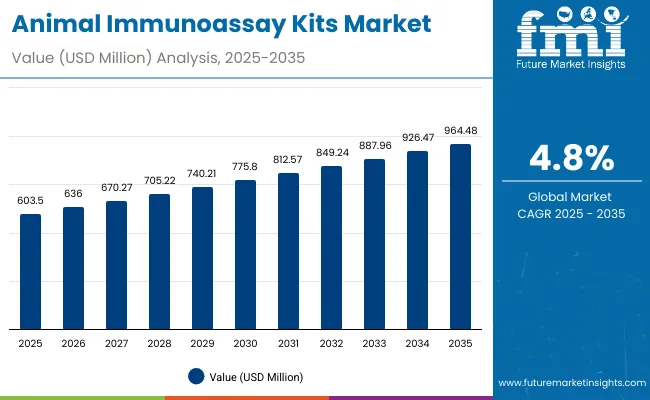
Animal Immunoassay Kits Market Key Takeaways
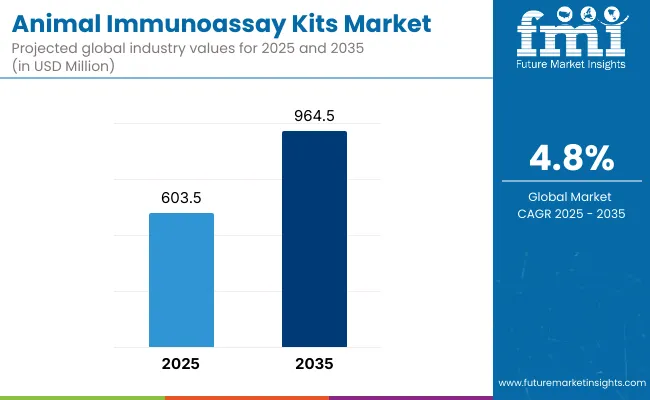
| Metric | Value |
|---|---|
| Estimated Value in (2025E) | USD 603.5 million |
| Forecast Value in (2035F) | USD 964.5 million |
| Forecast CAGR (2025 to 2035) | 4.8% |
The overall market size is expected to grow by nearly 1.6X during the same period, supported by increasing focus on animal health diagnostics, rising pet ownership worldwide, and growing demand for rapid and accurate diagnostic testing in veterinary practices.
Between 2025 and 2030, the animal immunoassay kits market is projected to expand from USD 603.5 million to USD 762.9 million, resulting in a value increase of USD 159.4 million, which represents 44.2% of the total forecast growth for the decade. This phase of growth will be shaped by rising awareness about preventive veterinary care, increasing demand for point-of-care testing solutions, and growing penetration of advanced diagnostic technologies in emerging markets. Veterinary diagnostic companies are expanding their immunoassay kit portfolios to address the growing demand for effective testing solutions for various animal health conditions.
From 2030 to 2035, the market is forecast to grow from USD 762.9 million to USD 964.5 million, adding another USD 201.5 million, which constitutes 55.8% of the overall ten-year expansion. This period is expected to be characterized by expansion of specialized veterinary diagnostic centers, integration of digital health platforms with diagnostic testing, and development of personalized treatment protocols for animals. The growing adoption of evidence-based veterinary medicine and healthcare provider recommendations will drive demand for clinically proven animal immunoassay kits with enhanced accuracy and reliability.
Between 2020 and 2025, the animal immunoassay kits market experienced steady expansion, driven by increasing recognition of zoonotic diseases and growing acceptance of advanced diagnostic approaches in veterinary care. The market developed as veterinary practitioners recognized the need for comprehensive diagnostic solutions to address complex animal health conditions. Clinical research and regulatory approvals began emphasizing the importance of rapid diagnostic testing in achieving better treatment outcomes for various animal health challenges.
Market expansion is being supported by the increasing prevalence of infectious diseases in animals and the corresponding demand for more effective diagnostic approaches. Modern veterinary practitioners are increasingly focused on immunoassay testing that can provide rapid results, improve treatment decisions, and reduce the burden of complex laboratory procedures. The proven efficacy of specific immunoassay kits in detecting various conditions like infectious diseases, parasitic infections, and reproductive disorders makes them essential components of comprehensive veterinary diagnostic protocols.
The growing emphasis on preventive veterinary care and precision animal medicine is driving demand for tailored diagnostic solutions that address individual animal needs and specific health conditions. Veterinary practitioner preference for simplified testing procedures that provide accurate results in clinical settings is creating opportunities for innovative product development. The rising influence of clinical guidelines and evidence-based treatment protocols is also contributing to increased adoption of proven animal immunoassay kits across different animal populations and therapeutic areas.
The market is segmented by animal type, application, end user, and region. By animal type, the market is divided into companion animals and livestock/farm animals. Based on application, the market is categorized into infectious disease diagnostics, parasitology, reproductive tests, zoonotic pathogens, and others. In terms of end user, the market is segmented into veterinary clinics & hospitals, diagnostic laboratories, research & academic institutes, and home/pet owners. Regionally, the market is divided into North America, Europe, East Asia, South Asia & Pacific, Latin America, and Middle East & Africa.
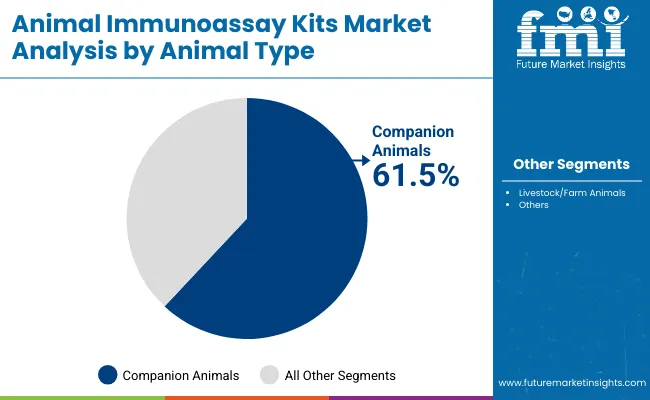
The companion animals segment is projected to account for 61.5% of the animal immunoassay kits market in 2025, reaffirming its position as the category's dominant animal type. Veterinary practitioners increasingly recognize the growing importance of diagnostic testing for pets and companion animals, particularly as pet ownership continues to rise globally and pet owners become more invested in their animals' health and wellbeing. This segment addresses the comprehensive diagnostic needs of dogs, cats, and other companion animals across various health conditions.
This animal type forms the foundation of most veterinary diagnostic protocols, as it represents the most economically viable and widely accepted testing approach in companion animal medicine. Regulatory approvals and extensive clinical research continue to strengthen confidence in these testing solutions. With increasing recognition of the human-animal bond and the importance of preventive care for companion animals, immunoassay kits for companion animals align with both acute diagnostic needs and long-term health management goals. Their broad therapeutic utility across multiple conditions ensures sustained market dominance, making them the central growth driver of animal immunoassay kit demand.
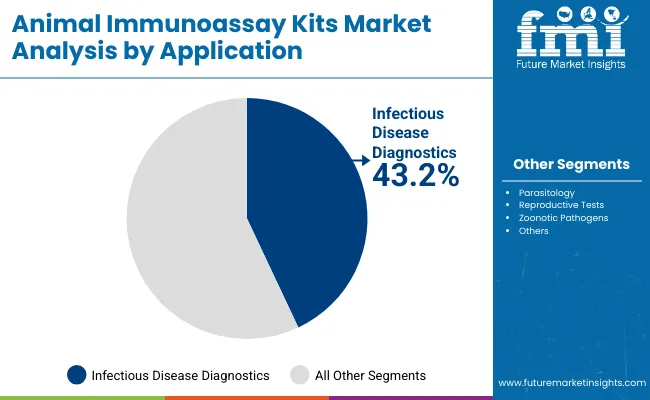
Infectious disease diagnostics is projected to represent 43.2% of animal immunoassay kits demand in 2025, underscoring its role as the primary application driving testing adoption. Veterinary practitioners recognize that infectious diseases pose significant threats to animal health and require rapid, accurate diagnostic testing that single conventional methods cannot adequately provide. Immunoassay kits offer enhanced accuracy in detecting pathogens and reducing transmission risks among animal populations.
The segment is supported by the critical nature of infectious diseases requiring immediate diagnostic confirmation and the growing recognition that rapid testing approaches can improve treatment outcomes and prevent disease spread. Additionally, veterinary practices are increasingly adopting evidence-based diagnostic guidelines that recommend specific immunoassay tests for optimal results. As clinical understanding of infectious disease patterns advances, immunoassay testing will continue to play a crucial role in comprehensive diagnostic strategies, reinforcing their essential position within the animal diagnostic market.
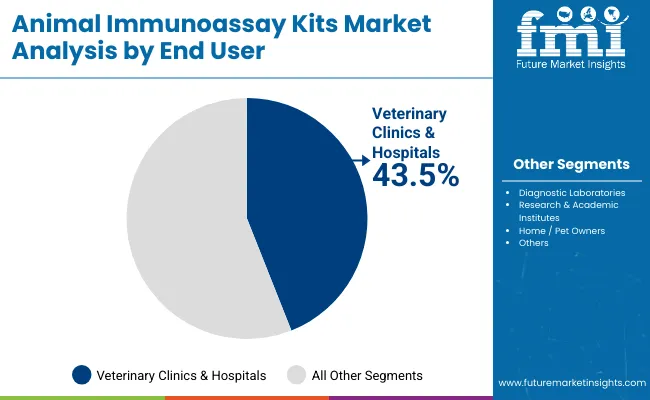
The veterinary clinics & hospitals segment is forecasted to contribute 43.5% of the animal immunoassay kits market in 2025, reflecting the primary role of veterinary healthcare facilities in animal diagnostic testing and patient care. Pet owners and livestock managers rely on accessible, professional veterinary services for ongoing health management, making veterinary clinics the cornerstone of animal immunoassay kit utilization. This segment provides essential services including diagnostic testing, treatment recommendations, and ongoing health monitoring.
The segment benefits from established relationships between animal owners and veterinarians, who provide continuity of care and diagnostic expertise. Veterinary clinics also offer advantages in terms of professional interpretation of test results, treatment planning, and patient follow-up care. With growing emphasis on comprehensive animal healthcare and professional veterinary services, clinics and hospitals serve as critical access points for animal immunoassay kits, making them fundamental drivers of market accessibility and growth.
The animal immunoassay kits market is advancing steadily due to increasing recognition of zoonotic diseases and growing demand for comprehensive diagnostic approaches. However, the market faces challenges including complex regulatory pathways for veterinary diagnostics, potential for false results, and concerns about test interpretation by non-professionals. Innovation in testing technologies and point-of-care diagnostic protocols continue to influence product development and market expansion patterns.
Expansion of Diagnostic Laboratories and Specialty Veterinary Care Channels
The growing adoption of specialized veterinary diagnostic facilities is enabling more sophisticated testing capabilities and comprehensive health monitoring. Diagnostic laboratories offer advanced testing services, including specialized immunoassays and comprehensive health panels, that are particularly important for complex diagnostic cases. Specialty care channels provide access to veterinary specialists who can optimize diagnostic testing selection and interpretation.
Integration of Digital Health Platforms and Test Result Management Systems
Modern veterinary diagnostic companies are incorporating digital health technologies such as electronic medical records integration, digital test result reporting, and client portal access to enhance diagnostic testing management. These technologies improve communication between veterinarians and animal owners, enable real-time monitoring of test results, and provide better coordination between healthcare providers. Advanced digital platforms also enable trend analysis and early identification of potential health issues or disease outbreaks.
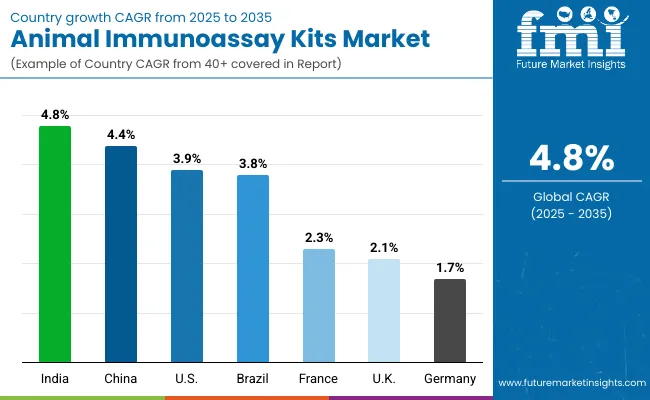
| Countries | CAGR (2025 to 2035) |
|---|---|
| India | 4.8% |
| China | 4.4% |
| USA | 3.9% |
| Brazil | 3.8% |
| France | 2.3% |
| UK | 2.1% |
| Germany | 1.7% |
The animal immunoassay kits market is experiencing varied growth globally, with India leading at a 4.8% CAGR through 2035, driven by expanding veterinary infrastructure, increasing pet ownership, and growing awareness of animal health importance. China follows at 4.4%, supported by livestock industry modernization, increasing recognition of animal diagnostics importance, and expanding veterinary coverage. The USA shows growth at 3.9%, representing a mature market with established diagnostic patterns and regulatory frameworks. Brazil demonstrates growth at 3.8%, emphasizing improved access to veterinary care and diagnostic testing adoption. Europe records 2.3% growth, focusing on evidence-based diagnostic protocols and comprehensive animal healthcare systems.
The report covers an in-depth analysis of 40+ countries; seven top-performing countries are highlighted below.
Revenue from animal immunoassay kits in China is projected to exhibit steady growth with a CAGR of 4.4% through 2035, driven by ongoing livestock industry modernization and increasing recognition of animal health as a priority issue. The country's expanding veterinary infrastructure and growing availability of specialized diagnostic services are creating significant opportunities for immunoassay testing adoption. Major international and domestic diagnostic companies are establishing comprehensive distribution networks to serve the growing population of animals requiring diagnostic testing across urban and rural regions.
Revenue from animal immunoassay kits in India is expanding at a CAGR of 4.8%, supported by increasing veterinary accessibility, growing animal health awareness, and expanding diagnostic market presence. The country's large animal population and increasing recognition of animal health conditions are driving demand for effective diagnostic testing solutions. International diagnostic companies and domestic manufacturers are establishing distribution channels to serve the growing demand for quality animal diagnostic products.
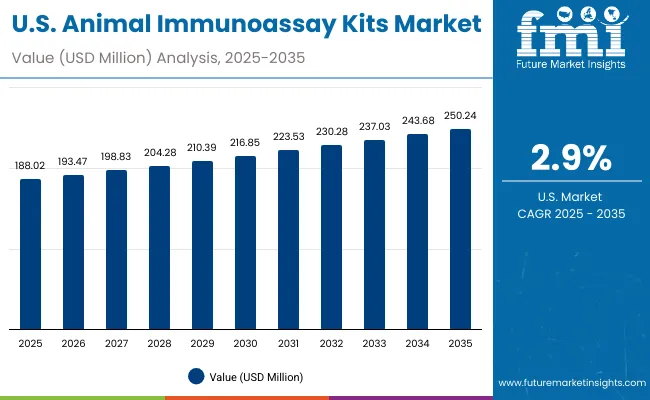
Demand for animal immunoassay kits in the USA is projected to grow at a CAGR of 3.9%, supported by well-established veterinary care systems and evidence-based diagnostic guidelines. American veterinary practitioners consistently utilize immunoassay testing for various health conditions and preventive care protocols. The market is characterized by mature diagnostic protocols, comprehensive veterinary coverage, and established relationships between veterinary providers and diagnostic companies.
Revenue from animal immunoassay kits in Brazil is projected to grow at a CAGR of 3.8% through 2035, driven by veterinary system development, increasing access to animal healthcare, and growing recognition of animal health importance. Brazilian veterinary practitioners are increasingly adopting immunoassay testing approaches for various animal health conditions, supported by expanding diagnostic market presence and improved testing accessibility.
Revenue from animal immunoassay kits in the UK. is projected to grow at a CAGR of 2.1% through 2035, supported by comprehensive veterinary frameworks and evidence-based diagnostic guidelines that facilitate appropriate use of immunoassay testing for various animal health conditions. British veterinary practitioners consistently utilize established protocols for diagnostic testing management, emphasizing patient outcomes and diagnostic optimization within integrated care systems.
Revenue from animal immunoassay kits in Germany is projected to grow at a CAGR of 1.7% through 2035, supported by the country's well-established veterinary care infrastructure, comprehensive animal healthcare coverage, and systematic approach to animal health management. German veterinary practitioners emphasize evidence-based diagnostic testing utilization within structured healthcare frameworks that prioritize clinical effectiveness and animal welfare.
Revenue from animal immunoassay kits in France is projected to grow at a CAGR of 2.3% through 2035, supported by the country's comprehensive veterinary system, established animal healthcare infrastructure, and systematic approach to animal health management. French veterinary practitioners emphasize evidence-based diagnostic testing utilization within integrated care frameworks that prioritize patient outcomes and treatment continuity.
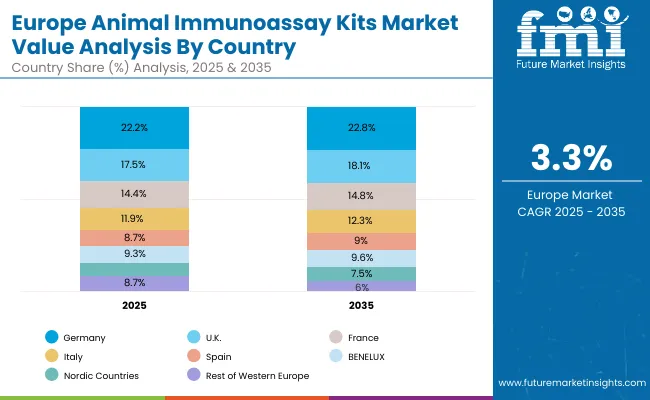
The animal immunoassay kits market in Europe is projected to expand steadily through 2035, supported by increasing adoption of advanced diagnostic testing in veterinary practice, rising prevalence of animal health concerns, and ongoing clinical innovation in diagnostic technologies. Germany will continue to lead the regional market, accounting for 22.2% in 2025 and rising to 22.8% by 2035, supported by a strong veterinary research base, reimbursement pathways, and robust animal healthcare infrastructure. The United Kingdom follows with 17.5% in 2025, increasing to 18.1% by 2035, driven by comprehensive veterinary guidelines, digital health integration, and expanding specialist networks.
France holds 14.4% in 2025, edging up to 14.8% by 2035 as veterinary practices expand diagnostic testing protocols and demand grows for comprehensive health monitoring. Italy contributes 11.9% in 2025, remaining broadly stable at 12.3% by 2035, supported by strong regional veterinary programs and growing clinical adoption. Spain represents 8.7% in 2025, inching upward to 9.0% by 2035, underpinned by strengthening access to veterinary services and animal health programs.
BENELUX markets together account for 9.3% in 2025, moving to 9.6% by 2035, supported by innovation-friendly regulatory frameworks and academic-industry collaboration. The Nordic countries represent 7.2% in 2025, marginally increasing to 7.5% by 2035, with demand fueled by progressive animal healthcare systems and early adoption of evidence-based veterinary care. The Rest of Western Europe moderates from 8.7% in 2025 to 6.0% by 2035, as larger core markets capture a greater share of investment, clinical trials, and adoption of diagnostic testing protocols.
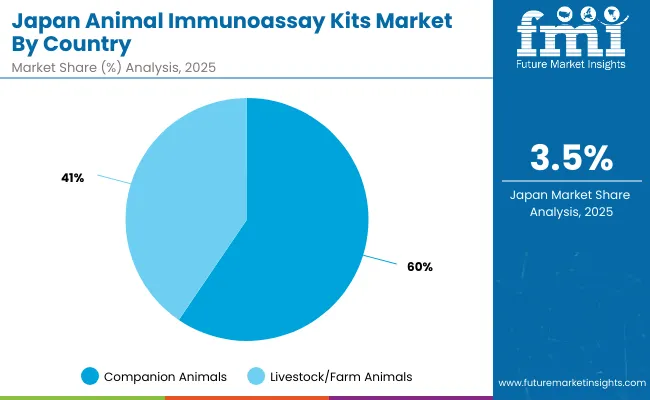
The animal immunoassay kits market in Japan is set to remain diversified across animal types in 2025, reflecting clinical preferences in veterinary practice and evolving diagnostic patterns. Companion Animals combinations dominate with a 59.5% share in 2025, supported by their central role in pet healthcare, increasing pet ownership, and growing investment in companion animal health.
Livestock/Farm Animals testing represents 40.5% in 2025, gaining importance from agricultural modernization targeting livestock health management and disease prevention benefits. This segment reflects the ongoing importance of agricultural animal health in Japan's farming industry and the adoption of preventive healthcare approaches in livestock management.
The market distribution reflects Japan's balanced approach to animal healthcare, with significant emphasis on both companion animal care reflecting the country's pet-loving culture and livestock health supporting agricultural productivity. This segmentation demonstrates the comprehensive nature of animal healthcare in Japan and the growing recognition of diagnostic testing importance across all animal categories.
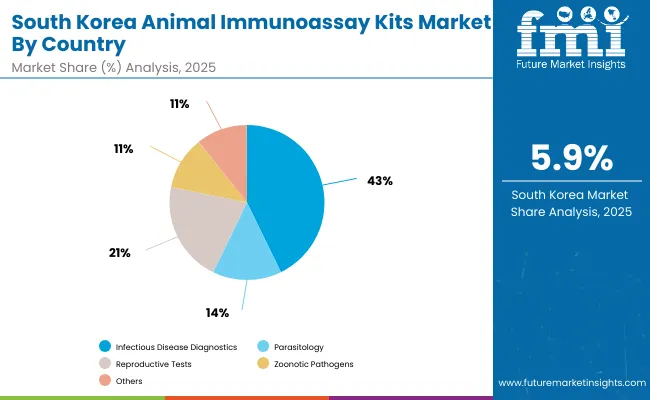
The animal immunoassay kits market in South Korea in 2025 is shaped by strong demand across core diagnostic applications, reflecting both clinical prevalence and testing guidelines. Infectious Disease Diagnostics accounts for the largest share at 42.8%, supported by high rates of infectious disease testing, growing awareness of zoonotic diseases, and increasing integration of preventive diagnostic protocols.
Reproductive Tests follow with 21.0%, driven by the growing importance of breeding management, enhanced reproductive health monitoring, and wider adoption of reproductive testing protocols in both companion and farm animals. Parasitology contributes 14.4%, supported by the established need for parasite detection and growing awareness of parasitic disease prevention.
Zoonotic Pathogens testing holds 11.1%, reflecting growing concern about diseases transmissible between animals and humans and enhanced surveillance protocols. The remaining 10.7% is attributed to other applications, including general health screening, metabolic disorders, and emerging diagnostic applications, highlighting opportunities for expanded clinical adoption and specialized testing protocols.
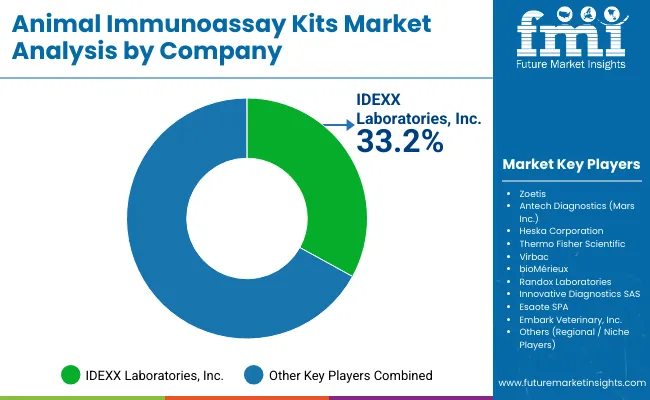
The animal immunoassay kits market is characterized by competition among established veterinary diagnostic companies, specialty animal health focused firms, and emerging diagnostic technology manufacturers. Companies are investing in clinical research, regulatory compliance, strategic partnerships, and veterinary practitioner education to deliver effective, accurate, and accessible diagnostic testing solutions. Product development, clinical validation, and market access strategies are central to strengthening product portfolios and market presence.
IDEXX Laboratories Inc., USA-based, leads the market with 33.2% global value share, offering clinically-proven animal immunoassay kits with a focus on accuracy and veterinary outcomes. Zoetis provides comprehensive diagnostic products with emphasis on accessibility and clinical effectiveness. Antech Diagnostics (Mars Inc.) focuses on innovative testing technologies and specialized diagnostic services for veterinary practices. Heska Corporation delivers established diagnostic products with strong clinical evidence and veterinary practitioner acceptance.
Thermo Fisher Scientific operates across global markets with focus on bringing innovative diagnostic technologies to veterinary applications. Virbac provides comprehensive animal health portfolios including diagnostic products across multiple therapeutic areas. bioMérieux specializes in advanced diagnostic testing solutions with emphasis on accuracy and reliability. Randox Laboratories, Innovative Diagnostics SAS, Agrolabo S.p.A., and other players provide specialized testing alternatives and innovative formulations to enhance market accessibility and veterinary access to essential diagnostic tools.
Key Players in the Animal Immunoassay Kits Market
| Items | Values |
|---|---|
| Quantitative Units (2025) | USD 603.5 Million |
| Animal Type | Companion Animals, Livestock/Farm Animals |
| Application | Infectious Disease Diagnostics, Parasitology, Reproductive Tests, Zoonotic Pathogens, Others |
| End User | Veterinary Clinics & Hospitals, Diagnostic Laboratories, Research & Academic Institutes, Home/Pet Owners |
| Regions Covered | North America, Europe, East Asia, South Asia & Pacific, Latin America, Middle East & Africa |
| Countries Covered | United States, Canada, United Kingdom, Germany, France, China, Japan, South Korea, India, Brazil, Australia and 40+ countries |
| Key Companies Profiled | IDEXX Laboratories Inc., Zoetis, Antech Diagnostics (Mars Inc.), Heska Corporation, Thermo Fisher Scientific, Virbac , bioMérieux , Randox Laboratories, Innovative Diagnostics SAS, Agrolabo S.p.A. |
| Additional Attributes | Dollar sales by animal type and diagnostic application, regional demand trends, competitive landscape, veterinary practitioner preferences for specific testing solutions, integration with specialty diagnostic channels, innovations in rapid testing formats, diagnostic accuracy optimization, and clinical outcome enhancement |
The global animal immunoassay kits market is valued at USD 603.5 million in 2025.
The size for the animal immunoassay kits market is projected to reach USD 964.5 million by 2035.
The animal immunoassay kits market is expected to grow at a 4.8% CAGR between 2025 and 2035.
The key animal type segments in the animal immunoassay kits market are companion animals, livestock animals, and wildlife/zoo animals.
In terms of animal type, companion animals segment is set to command 61.5% share in the animal immunoassay kits market in 2025.






Full Research Suite comprises of:
Market outlook & trends analysis
Interviews & case studies
Strategic recommendations
Vendor profiles & capabilities analysis
5-year forecasts
8 regions and 60+ country-level data splits
Market segment data splits
12 months of continuous data updates
DELIVERED AS:
PDF EXCEL ONLINE
Animal Healthcare Packaging Market Size and Share Forecast Outlook 2025 to 2035
Animal External Fixation Market Size and Share Forecast Outlook 2025 to 2035
Animal Antibiotics and Antimicrobials Market Size and Share Forecast Outlook 2025 to 2035
Animal Auto-Immune Disease Diagnostics Market Size and Share Forecast Outlook 2025 to 2035
Animal Disinfectants Market Size and Share Forecast Outlook 2025 to 2035
Animal Health Software Market Size and Share Forecast Outlook 2025 to 2035
Animal Antimicrobials and Antibiotics Market Size and Share Forecast Outlook 2025 to 2035
Animal Sedative Market Size and Share Forecast Outlook 2025 to 2035
Animal Genetics Market Size and Share Forecast Outlook 2025 to 2035
Animal Peptides Market Size and Share Forecast Outlook 2025 to 2035
Animal Gastroesophageal Reflux Disease Market Size and Share Forecast Outlook 2025 to 2035
Animal Parasiticide Market Size and Share Forecast Outlook 2025 to 2035
Animal Model Market Analysis - Size, Share, and Forecast Outlook 2025 to 2035
Animal Feed Additives Market Analysis - Size, Share, & Forecast Outlook 2025 to 2035
Animal Feed Organic Trace Minerals Market Size and Share Forecast Outlook 2025 to 2035
Animal Nutrition Chemicals Market Analysis - Size, Share, and Forecast Outlook 2025 to 2035
Animal Artificial Insemination Market Report - Trends, Demand & Industry Forecast 2025 to 2035
Animal Wound Care Market Size and Share Forecast Outlook 2025 to 2035
Animal Parasiticides Market Size and Share Forecast Outlook 2025 to 2035
Animal Feeds Microalgae Market Size and Share Forecast Outlook 2025 to 2035

Thank you!
You will receive an email from our Business Development Manager. Please be sure to check your SPAM/JUNK folder too.
Chat With
MaRIA